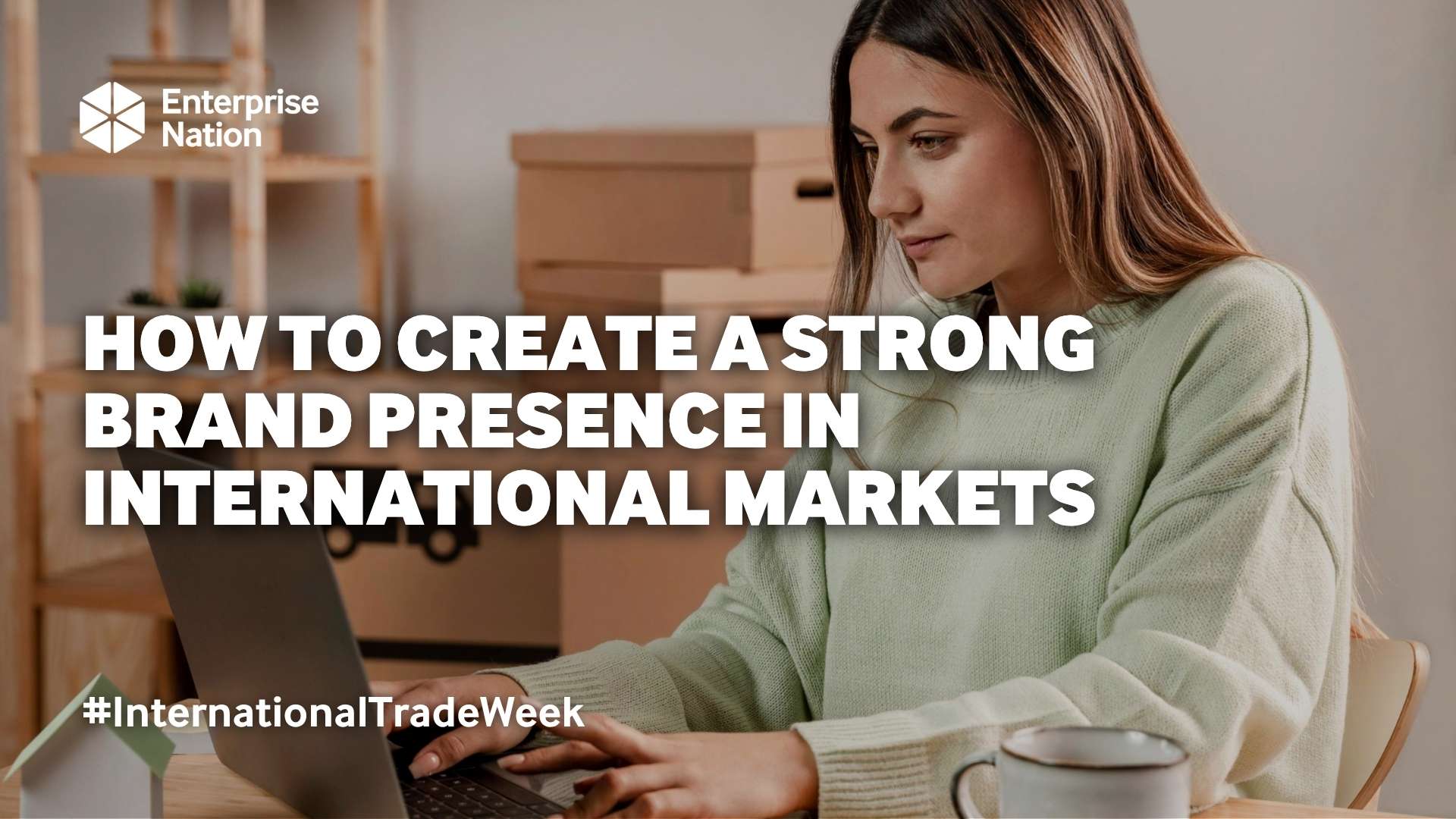How to create a strong brand presence in international markets


Enterprise Nation
Posted: Wed 5th Nov 2025
Some brands travel well. Others don't. The difference is rarely the product itself. It's how well the brand has been tuned to the people, culture and expectations of each market.
When you expand your brand into overseas markets, you're asking strangers with different reference points to understand, trust and choose you. That takes more than a translation and a nice logo.
This blog focuses on the practical side of building your brand internationally. You'll learn how to research local audiences, adapt your message for foreign markets and maintain a clear identity as you expand your brand overseas.
Whether you're entering a single new country or building a wider strategy for international expansion, the goal is simple: be understood, be relevant and be consistent wherever your brand appears.
Skip to the step-by-step guide to building an international brand
What is international branding?
International branding is the work of creating a brand identity that customers in different countries can recognise, understand and trust.
It involves deciding how your brand should look, sound and behave across your target markets, and then applying that identity in a way that makes sense locally.
Successful international brands are built on two ideas that must coexist: familiarity and relevance.
Customers should be able to recognise you wherever they are, but they should also feel that your brand speaks to them in a way that fits their culture and expectations.
Some elements – such as your purpose, values and visual identity – should stay stable. Others – such as tone, product messaging or campaign ideas – may need to change from country to country.
A good overseas branding strategy gives customers a clear sense of who you are, even if the expression of your brand varies slightly from one market to the next.
This helps you build brand identity across countries in a way that feels joined up rather than fragmented.
There are two common approaches:
Standardisation – keeping most elements of the brand consistent in every market
Localisation – adapting parts of the brand so it fits the culture and expectations of each country
Many successful brands use a blend of both. They protect the core and adapt the rest.
The benefits of building your brand internationally
Expanding your brand into overseas markets can open up opportunities that are harder to find by trading in one country alone.
A strong international branding strategy can help you:
reach more customers
compete more effectively
give your business some long-term stability
Benefit #1: Access to new markets and revenue
When people in more than one country understand and recognise your brand, the size or pace of your home market isn't going to limit you.
A strong brand presence in international markets can help you grow faster and make you less reliant on a single economy.
Benefit #2: Credibility and brand recognition
When customers see a brand that appears consistently across borders, it signals reliability.
This can make it easier to win trust, attract international buyers and open conversations with retailers, distributors and partners. In time, this recognition feeds into loyalty, referrals and repeat business.
Benefit #3: A stronger reputation at home
Being seen as a brand that operates in a number of different countries can boost confidence in your domestic market, as well as among investors and future partners.
It positions you as a serious player, even if you're still a small business building your global footprint.
Benefit #4: Gains in efficiency
When you build one brand identity for several markets instead of reinventing it for each country, you make better use of your time and budget.
You can then invest more in marketing a brand in a new country, rather than constantly reworking the basics.
Download our free exporting guides
USA / China / India / Singapore / UAE / Germany / France / Australia
How to build an international brand
To build a brand that can expand into new markets overseas, you need a clear process. Everything becomes much easier to manage when you break it down into stages.
The aim is to understand your audience, shape your message, stay consistent and adapt where it matters.
Below are the key steps involved in effective international branding and brand building overseas.
Step 1: Know your audience in each market
Before you talk about your brand, learn about the people you want to reach. Customers' expectations, humour, buying habits, design preferences and even colour meanings can shift from one country to another.
Market research helps you understand those differences and avoid assumptions. Focus on:
who your customers are
what they need
how they make buying decisions
which local competition they already listen to
This insight forms the foundation of your overseas branding strategy. It tells you how to build an international brand that connects, not just exists.
Step 2: Shape brand values that carry across borders
Your values will anchor your brand identity across countries. They don't need to change for each market, but they do need to be easy for people to understand and relate to.
Values like quality, fairness, innovation or transparency tend to translate well, while very culture-specific themes may not.
If your values resonate at an emotional level, it becomes easier to earn trust in new markets.
Step 3: Create a clear overseas branding strategy
Once you understand your audience and values, you can develop a strategy that defines:
how you want people in each new country to see you
what emotions and associations you want to create
which parts of your brand must stay consistent
which elements you may adapt
This gives your campaigns, partnerships and wider global brand development more direction.

Step 4: Adapt your message for local markets
Local audiences respond best when a brand speaks in a way that fits their culture.
Localising your brand message for export doesn't mean changing your voice completely. It means adjusting tone, references and examples so your message lands well in each country.
Small shifts can make a big difference. This is one of the defining skills in marketing a brand in a new country.
Step 5: Protect consistency across markets
As you expand, you must maintain a consistent brand across international markets. Customers should recognise you instantly, no matter where they are.
Consistency should apply to your:
This keeps your identity intact, even as you localise parts of your content or campaigns.
Step 6: Build a digital brand presence that travels
Your online brand is often the first thing international buyers see. Your website, content, social channels and product listings should all work for customers in other countries.
At the very least, these customers should be clear on:
your use of language
the local currencies you're trading in
which of your products are available to them
how you'll deliver the products to them
Digital clarity is as important to brand presence in international markets as physical marketing or events.
Step 7: Work with local suppliers and partners
Working with overseas brand partners – such as distributors, agencies or local creators – can lead to more and more people recognising your brand.
Local partners understand cultural norms, media habits and competitive landscapes. They can help you avoid missteps and build relevance faster.
Step 8: Review, test and adjust
International branding is ever-changing. Markets shift, trends move and preferences evolve. By regularly reviewing your brand, you can prevent it from becoming disconnected or outdated.
How to adapt your brand for foreign markets
Even the strongest brands need adjustments when entering a new country. Local culture influences tone, imagery, humour, colours, buying habits and levels of formality.
Adapting your brand for foreign markets helps you stay relevant without losing your identity.
Start with language. Good translation isn't enough. Check for meanings, slang and cultural references that may confuse or alienate customers.
Make sure your phrases and product names are easy to pronounce and carry the right message.
Next, review your visuals. Colours, symbols and photography can carry very different signals across cultures. A style that suggests trust or premium quality in one country may suggest something entirely different elsewhere.
Adjust where you need to, but keep the look and feel familiar so customers still recognise you.
Finally, consider local expectations. This might include preferred payment options, communication style or how customers define "good service".
If your brand respects these expectations, you'll find it much easier to earn attention and build credibility in a new market.
Adapting in this way keeps your brand relevant and clear, while protecting the core identity you've already built.
Checklist: How to create a consistent brand identity across countries
Consistency helps customers recognise and trust your brand, even when they encounter it in a different country.
Use this checklist to keep your identity aligned across every market:
Identity: Check that your brand purpose, values and promise stay the same in every country you operate in.
Visuals: Keep your logo, colour palette and core design style consistent, even if you adjust imagery to suit local tastes.
Voice: Use the same tone and personality. Adapt wording for clarity, but stay true to the way your brand speaks.
Story: Tell a unified brand story. Allow for cultural nuance, but keep the same bigger narrative.
Experience: Aim for a familiar customer experience across markets. Service levels and standards should be clear, reliable and repeatable.
If you maintain these core elements, your brand will feel connected from country to country, while still having room to localise your message where it matters.
Case study: Sell Your Cycle – from UK niche to international reach
Abdullah Hussain founded Sell Your Cycle during the COVID-19 lockdown period of 2020, turning a side-hustle into a full-time business once he left his tech job.
He began by buying, refurbishing and selling bikes in the UK, but soon realised that demand and opportunities stretched beyond domestic customers.
Over time, the company shipped bikes to Nigeria, Poland, Norway, Canada, the US and the Middle East.
Abdullah saw the UK used-bike market as underdeveloped compared to other industries. He built his business model around standardising the buying and resale process for bikes, including launching a platform where sellers upload bikes and trade buyers bid.
This allowed Sell Your Cycle to serve an international buyer base and scale beyond UK borders.
Reaching buyers abroad
To reach overseas customers, the business made a name for itself as reliable and transparent.
As Sell Your Cycle expanded, Hussain also launched supporting services – like The Cycle Courier Co., a dedicated bike courier service with live-tracking and transparent delivery windows.
These added services helped maintain quality and brand consistency even when serving buyers abroad.
For example, when dealing with buyers in North America or the Middle East, the brand offered clear delivery and transport options, managed condition grading (via upcoming "Inspect A Bike"), and ensured that international customers saw the same high service standards as UK customers.
This kind of consistency in experience helped build the brand's presence in a number of markets and supported its reputation for reliability.
Abdullah's approach to international growth emphasised doing one thing well before scaling. He didn't rush into dozens of markets.
He focused first on understanding his customers, refining his systems and then shipping abroad with confidence.
His advice to others: don't jump in straight away – use the early years to build your processes, understand your market and create a runway for growth.
Key lessons from Abdullah's story
Identifying an underserved market at home and thinking beyond it allowed the brand to scale properly.
Building logistics and service processes (delivery, tracking, grading) was as important for international buyers as the product itself.
Consistent brand experience across markets (quality, communication, service) helps in establishing trust overseas.
Growth from one geography to many was made possible by a clear platform, transparent value (pricing, condition grading) and reliable delivery.
Conclusion
Expanding your brand into overseas markets takes patience, research and clarity.
When you understand each audience, adapt your message and protect the core of your identity, you give people in other countries a genuine reason to trust and choose you.
International branding is ongoing work. As you learn more about each market, your brand becomes sharper, more relevant and more resilient.
With a clear expansion strategy and a willingness to adapt, you can build a brand presence in international markets that lasts and grows.
People also read
How small businesses can find overseas buyers and start exporting
Expanding into foreign markets: Key barriers and how to break through
Managing language barriers and cultural differences when selling overseas
Trade internationally without the usual friction
Ready to grow your business beyond borders? Get the tools, insights and expert support you need to simplify cross-border payments, save money and scale with confidence. Join the programme today

Enterprise Nation
Disclaimer: The content provided on this site, whether by Grow London Local or by third parties, is by way of general guidance only. Grow London Local does not accept any liability for any loss or damage that any person incurs as a result of any content on this site. Please note that where you purchase paid services or content from third parties, your agreement is solely with those third parties.
Subscribe now
Never miss a post with the latest insights and updates.
You can view a sample here.
By subscribing you agree to our Terms of Use and Privacy Policy. You can unsubscribe at any time by using the "Unsubscribe" link at the bottom of any email we send you.

